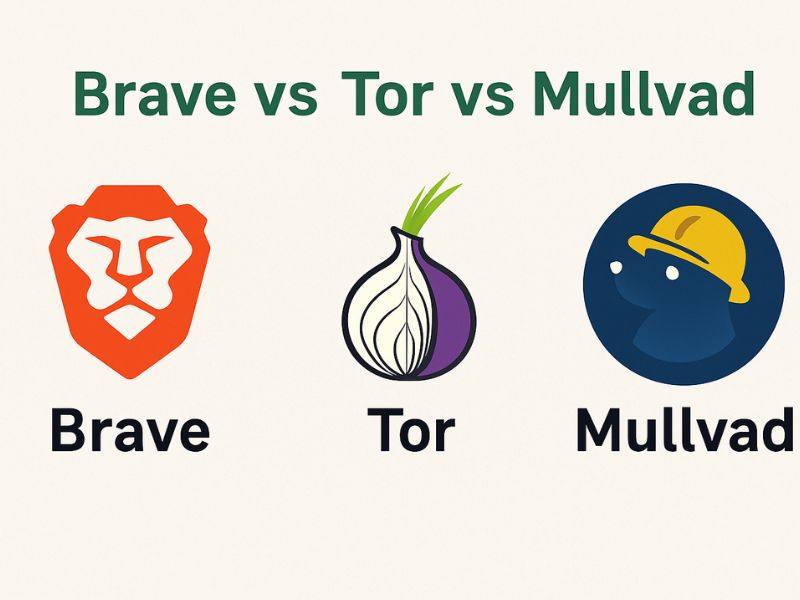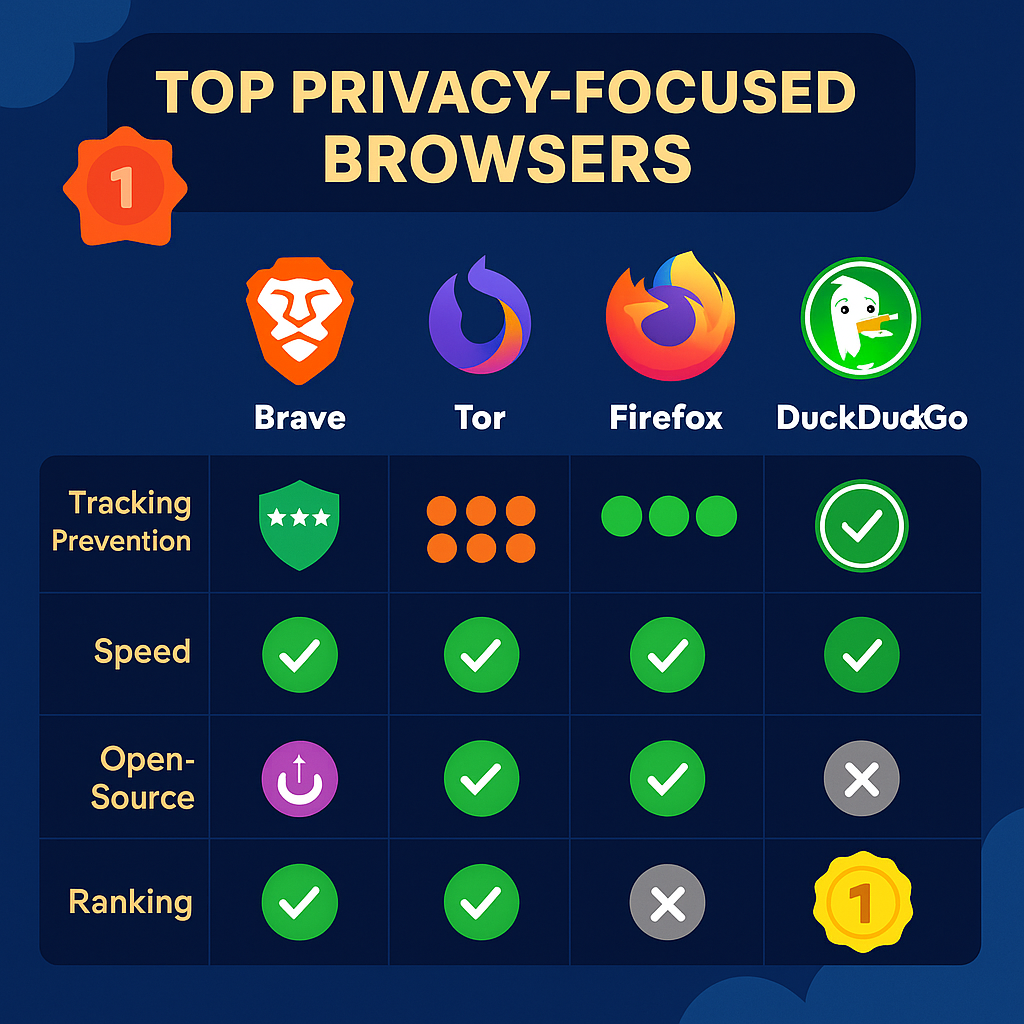Brave, Tor, Mullvad: What’s the Difference?

Brave vs Tor vs Mullvad: Which Private Browser Wins in 2025?
Choosing a private browser in 2025 is no longer a simple preference battle. Privacy risks are rising, tracking has become pervasive, and browsers now differ in fundamental philosophy.
Brave pursues performance and tracker blocking, Tor maximizes anonymity with multi-hop routing, and Mullvad Browser adopts Tor-style fingerprint defenses without Tor routing.
Therefore, the smartest approach is to map your threat model to the tool rather than chasing a one-size-fits-all winner.
Moreover, you probably want something that works smoothly on modern sites, loads fast, and avoids creepy profiling.
However, some workflows genuinely require strong unlinkability and network-level confidentiality.
In addition, budget, trust in a VPN provider, and extension needs will influence the decision.
Consequently, this guide compares Brave vs Tor in depth and explains where Mullvad fits for a balanced middle path.
Brave vs Tor at a Glance: Strengths and Trade-offs
- Brave: Blocks ads/trackers by default, upgrades to HTTPS, and reduces fingerprint signals. Consequently, pages feel fast and familiar. However, it does not anonymize your IP on its own.
- Tor: Routes traffic through volunteer relays so destinations see exit nodes, not you. As a result, anonymity is stronger, yet speeds are lower and CAPTCHAs appear more often.
- Mullvad Browser: Reuses Tor’s fingerprinting strategy without Tor routing; pair it with a reputable VPN for IP privacy. Therefore, performance is typically better than Tor while privacy remains robust.
How They Work: Brave vs Tor Mechanics and Mullvad’s Role
Brave: Privacy-First Daily Driver
Brave is Chromium-based, so extensions and websites generally “just work.”
Moreover, Brave Shields blocks third-party ads and trackers at the network layer, which reduces page weight and limits data exfiltration.
In addition, HTTPS upgrades, script controls, and anti-fingerprinting tactics shrink the attack surface.
Therefore, Brave is a strong default for everyday browsing, particularly when paired with a trustworthy VPN for IP masking.
Tor: Anonymity and Uniform Fingerprints
Tor Browser, a modified Firefox, routes your traffic through multiple relays. Consequently, network observers struggle to link your activity to your origin IP.
In addition, Tor seeks to make users look similar, which reduces fingerprint uniqueness.
However, layered routing introduces latency, and strict defaults can break dynamic features.
Nonetheless, for high-risk research or sensitive communication, Tor remains the gold standard.
Mullvad Browser: Hardened Without Tor Routing
Mullvad Browser borrows Tor Browser’s fingerprinting defenses while using the regular internet.
As a result, pairing it with a no-logs VPN often provides credible IP privacy with better responsiveness than Tor.
Moreover, because traffic does not emerge from Tor exit nodes, many websites treat it like a normal browser session.
On the other hand, your privacy posture now depends more on VPN trust, payment method, and consistent operational habits.
Brave vs Tor: Privacy, Anonymity, and Fingerprinting
When comparing Brave vs Tor, philosophy matters. Brave minimizes surveillance capitalism by blocking trackers and shrinking identifiers.
Tor, by contrast, focuses on unlinkability against network-level observers using relays and circuit isolation.
Therefore, if advertisers and cross-site profiles are your main concern, Brave usually suffices.
If identity protection is paramount, Tor’s model is safer even though it is slower.
Meanwhile, Mullvad Browser straddles the middle: it keeps a uniform fingerprint pattern while delegating IP privacy to a VPN.
Tor vs Mullvad: Speed and Practicality
A nearby VPN endpoint can make Mullvad Browser feel almost like a standard setup.
Consequently, research, productivity, and moderate media consumption are comfortable.
However, Tor’s multi-hop routing adds latency by design, which makes large downloads, streaming, and gaming less pleasant.
In addition, some services challenge Tor users with repeated CAPTCHAs or restrict access entirely.
Therefore, if you value responsiveness but still want strong protections, Mullvad Browser with a reputable VPN is compelling.
Brave vs Mullvad: Extensions, Breakage, and Ease of Use
Brave taps into the Chrome Web Store, which means a vast extension ecosystem and high site compatibility.
Moreover, fewer hard breaks occur on dynamic sites and web apps.
Mullvad Browser, being Firefox-based and privacy-opinionated, works best with a lean extension set.
Consequently, you preserve uniform fingerprints and reduce accidental leaks.
However, if you require numerous extensions for work, Brave’s ecosystem may be more convenient.
Brave vs Tor Comparison: Speed, Compatibility, and UX
- Speed: Brave is typically the fastest due to aggressive blocking. Tor is slowest because of multi-hop circuits. Mullvad + VPN sits in between.
- Compatibility: Brave enjoys high compatibility with modern sites. Tor can trigger anti-abuse systems. Mullvad avoids many Tor-specific blocks.
- UX: Brave feels like Chrome without surveillance ads. Tor requires more patience. Mullvad is practical for long research sessions with privacy in mind.
Security Posture and Threat Models
Start with your risks. If you fear tracking pixels, third-party cookies, and cross-site scripts, Brave’s defaults are usually sufficient.
If you anticipate targeted correlation, location sensitivity, or network surveillance, Tor’s layered routing and isolation provide stronger guarantees.
In addition, if you want balanced privacy, Mullvad Browser with a trustworthy VPN offers a pragmatic middle ground.
Therefore, match the browser to your exposure rather than chasing absolute perfection.
Setup Playbook: Getting the Most Out of Each
Brave: Hardening Tips
- Enable strict Shields and HTTPS-Only mode. Moreover, review per-site permissions for scripts and fingerprinting controls.
- Use a reputable VPN on public Wi-Fi. Consequently, your IP privacy improves without losing speed.
- Limit optional extensions. In addition, audit permissions regularly and remove unused add-ons.
Tor: Safety Guidelines
- Avoid installing extra extensions; they increase fingerprint uniqueness. Therefore, stick to defaults.
- Do not log in to identity-linked accounts during sensitive sessions. Moreover, separate personas across circuits.
- Expect slower speeds and occasional breakage. Nonetheless, anonymity benefits outweigh friction for high-risk tasks.
Mullvad Browser: Balanced Workflow
- Pair with a nearby VPN server to reduce latency. Consequently, everyday tasks remain responsive.
- Keep extensions minimal to maintain uniform fingerprints. In addition, clear sessions routinely.
- Consider payment and account hygiene with your VPN. Therefore, align operational practices with your privacy goals.
Brave vs Tor: Use-Case Quick Picks
- Daily browsing and work: Choose Brave for speed and compatibility; add a VPN for travel and public networks.
- Sensitive research or activism: Prefer Tor for stronger unlinkability; accept slower performance as the trade-off.
- Long research sessions with privacy: Use Mullvad Browser + VPN; enjoy responsive performance with Tor-style fingerprint defenses.
Comparison Table (2025)
| Dimension | Brave | Tor | Mullvad Browser |
|---|---|---|---|
| Primary Goal | Private, fast everyday browsing | Network-level anonymity | Tor-style fingerprint defenses + VPN |
| Speed | Fastest among the three | Slowest (multi-hop) | Near-standard with nearby VPN |
| Compatibility | High (Chromium) | Medium (CAPTCHAs/breakage) | High (no Tor exit IPs) |
| IP Privacy | Needs VPN/proxy | Yes, via Tor network | Yes, via VPN |
| Fingerprinting | Good protections | Excellent (uniform profile) | Excellent (Tor-style) |
| Best For | Everyday privacy & speed | High-risk anonymity | Balanced privacy with usability |
Frequently Asked Questions
Is Brave private enough for daily use?
Yes. Brave blocks trackers, upgrades to HTTPS, and reduces fingerprint signals. However, it does not anonymize your IP; therefore, add a VPN when location privacy matters.
When is Tor the better option?
Choose Tor when identity protection outweighs speed. For example, sensitive research and whistleblowing benefit from Tor’s relays and isolation. Consequently, you should expect slower performance.
Where does Mullvad Browser make the most sense?
It is ideal when you want Tor-like fingerprint defenses without Tor latency. In addition, pairing with a strong VPN delivers practical IP privacy for long work sessions.
More From PM2Browser
- Google Chrome Guide 2025
- Firefox Browser Guide 2025
- Microsoft Edge 2025: Speed, Security & Simplicity
- Opera Browser 2025
- Chrome vs Brave
Trusted Outbound Resources
- Brave Official
- How Brave Shields Works
- Tor Project (Official)
- Tor Usage & Safety
- Mullvad Browser (Official)




